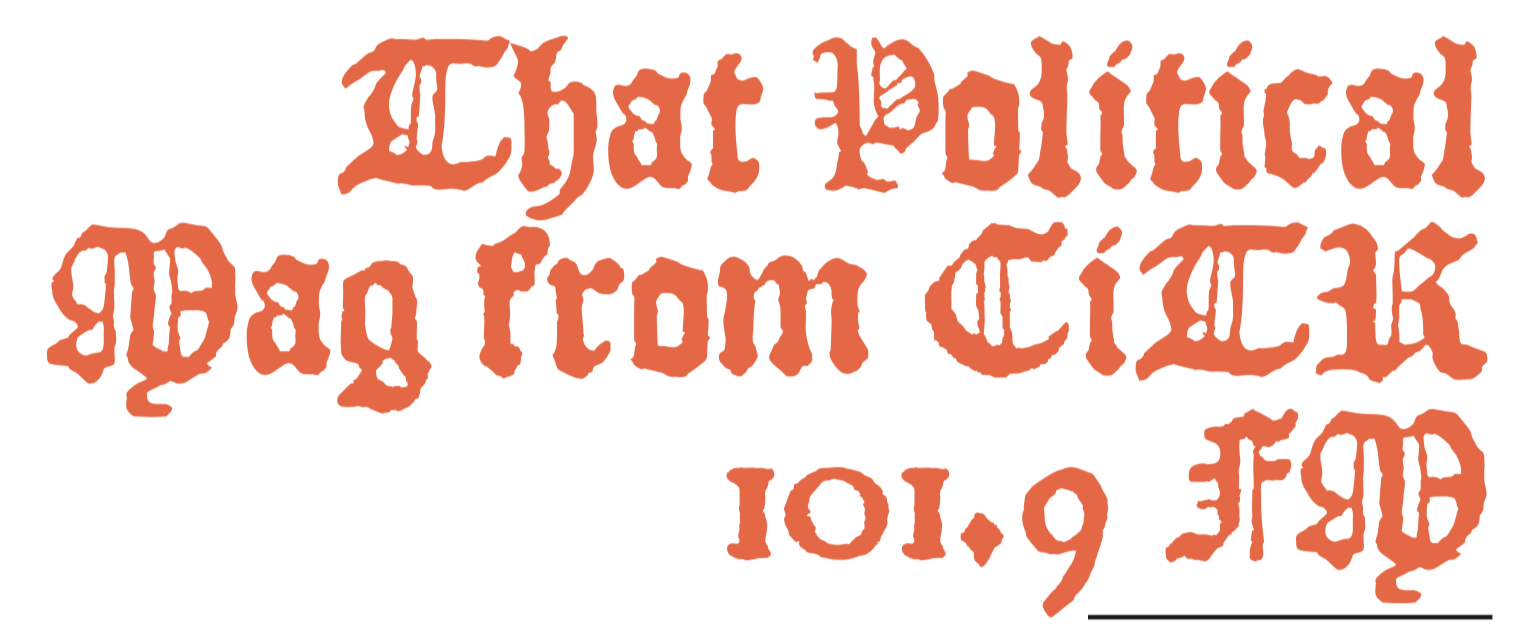What does it mean to be “too political?” I ask myself this every time we conduct a readership survey, when, like sour keys between general praise, honest suggestions and new music leads, there are comments that I’m too political and that my editorial direction has led Discorder astray. I live for these sour keys. They keep me motivated to continue profiling organizations and movements that challenge the reader to think outside their realms of understanding. And honestly, isn’t that what a dynamic publishing platform is all about? Discorder isn’t hard-hitting journalism, but we aren’t a mag of fluff pieces either. Like all good medicine, we supplement our bitter aftertaste with a little buzz.
So, when I read Jonathan Kew’s DOXA feature on page 6, and the Director of Programming, Selina Crammond, mentions that DOXA has been getting complaints for becoming too political with their program, I admit I got giddy. DOXA and Discorder are completely different, and yet, our structures are similar in that our teams both work an incredible amount of (often unpaid) overtime to produce something for the public that we hope will provoke emotion, even if that emotion is anger.
In this issue of Discorder, we feature several artists and organizations provoking emotion within their own corners of the universe. Dusty Babes Collective is a group of ceramicists challenging the conventions of clay; Girls Rock Camp Vancouver is working towards a more gender diverse music scene; DJ Kookum’s EDM sets overshadow the rap and country music she grew up around; Nasty Women Comedy pushes against Vancouver’s male-dominant comedy scene; grunt gallery’s urban screen brings storytelling to The Independent; and Heather Kai Smith’s artwork revisits history through gesture.
I would also like to remind readers that May is Asian Heritage Month. Last month, Mayor Gregor Robertson issued an apology to the Chinese community for the prejudice shown towards immigrants and their descendants by the City of Vancouver. In the same week, the City rolled over to amend zoning, seemingly at the request of the Vancouver Chinatown Business Improvement Area Society and the Vancouver Chinatown Merchants Association, which directly contradicts the efforts of community organizers standing up for legacy businesses and elders. In the VCBIA and VCMA joint press release, they accused younger activists of “reverse-zenophobia” and not representing the true stakeholders of Chinatown. If you live or work or play in Chinatown, especially this month, please take some time to research the neighbourhood and consider your position within it. Visit chinatown.today for current news and follow @chinatown_today on Twitter.
A+
BB
PUBLISHER’S NOTE
I’m thrilled to start as the new Station Manager at CiTR / Discorder! No doubt this will be a challenging and rewarding experience, and I look forward to being of service to the station and the community at large. A little about me:
Growing up (and still living) in the Downtown Eastside, I developed an interest in and passion for community building and grassroots art and culture in Vancouver. Fortunately, I have been able to pursue this passion as founder and Director of Red Gate Arts Society, which is committed to providing affordable, inclusive working, exhibition and performance space for artists, musicians, and creative individuals of all kinds, in a supportive and creative environment. I became the Executive Director of the Red Gate Revue Stage in 2016, expanding the disciplines that Red Gate can support to include theatre and dance.
Vancouver is at a crossroads. The cost of living in this city has risen to the point where it’s difficult for venues and audiences to take a chance on paying to see a show or buy an album from an unheard of or untested artist. In spite of that (or perhaps because of that — struggle often leads to amazing art!), the quality and diversity of music coming out of Vancouver is better than ever. As a city, we must decide what our priorities are. Grassroots art and culture can disappear unless conscious decisions and focused effort are made to facilitate it. I truly believe that we can make Vancouver an incredible city for everyone to live in, but it will take a lot of work and cooperation among many disenfranchised groups.
CiTR / Discorder has been a guiding voice in this effort and will continue to do so for many years to come. The Station Manager position will allow me to advance and expand my passionate efforts on behalf of Vancouver culture, guided always by the principles of collaborative governance, community building, and providing opportunities for lesser known and underrepresented artists to showcase their work.
-Ana Rose Carrico


